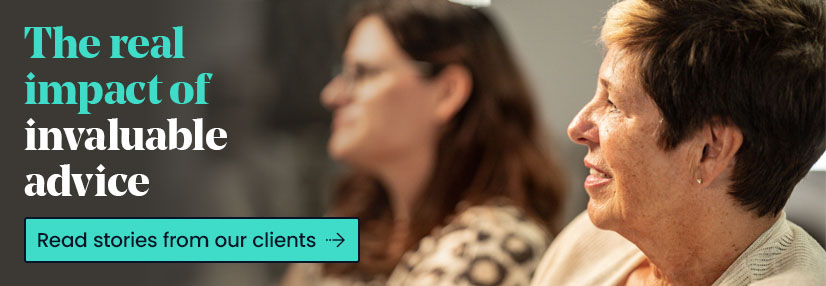- News
- Investing
Almost a third of parents are pessimistic about their children's financial futures, with fears ranging from their child never owning their own home to not being able to retire in later life.
This is according to our Real Life Advice Report 2025. It surveyed 8,000 people to find out how their attitudes to money, financial advice and the future had changed over time.

At a glance
- Nearly a third (31%) of parents are pessimistic about their children’s financial futures, whether it is getting on the property ladder, earning enough or being able to retire.
- The greatest fear among parents is that their child will never own a home. Four in 10 believe they won’t achieve this traditional cornerstone of financial security.
- Yet more than half of parents taking ongoing advice feel optimistic about their children’s financial future.
It’s natural for parents to want the best for their children, and it’s only natural for parents to worry about their futures. This is particularly the case in an era of rising living costs, increasingly unaffordable housing and a rapidly changing work environment.
The second chapter of this year’s Real Life Advice Report reveals a generation of parents torn between anxiety and optimism when they think about how financially comfortable and confident their children will be as they enter adulthood.
While four in ten (40%) feel positive, almost a third (31%) say they are pessimistic as they look ahead.
The biggest financial worries
The greatest fear among parents is that their children will never own a home. About 40% believe their children won’t ever get onto the property ladder, and will spend their life renting – or potentially living at home with Mum and Dad.
Average UK house prices have risen by 74% over the past 20 years, with a typical home now costing £268,200, according to Zoopla1. Coupled with tighter mortgage lending and higher stamp duty rates, home ownership feels increasingly out of reach.
The next biggest worry is around saving for retirement, with 38% of parents concerned that their child won’t be able to save enough. Generous defined benefit pensions have largely disappeared in the private sector, and the state pension falls short of what’s needed to fund a comfortable retirement.
In fact, more than a third of parents (36%) fear their son or daughter may never be able to stop working, and will never enjoy a well-earned retirement.
In terms of their child’s working life, inflation and artificial intelligence (AI) loom large as parental concerns. Nearly four in ten parents (37%) fear their children’s salaries won’t keep pace with inflation, while one in five (21%) worry that AI will reduce access to well-paid jobs.
Alexandra Loydon, Director of Advice Policy and Operations at St. James’s Place, says: “The financial world facing today’s children is undeniably more complex than it was for their parents and grandparents. Rising costs, the demise of more generous pension schemes, living longer in retirement, and housing that feels out of reach all combine to paint a challenging picture.”
Parental views across different UK regions
The report highlights how levels of optimism about children’s financial futures vary across the UK.
Parents in London feel the most optimistic (53%) and least pessimistic (24%) about their child or children’s financial future.
Those living in Northern Ireland and Scotland also experience high levels of optimism (44% and 42% respectively).
At the other end of the scale, parents in the South East and the South West are the least optimistic (both 34%). More than a third of parents in those regions are pessimistic about their children’s financial outlook (36% and 34% respectively).
Advice boosts optimism among parents
The picture is brighter for parents who receive ongoing professional advice. Those parents report feeling more optimistic about their child or children’s financial prospects (54% versus 34% that don’t receive advice).
Of those who are optimistic, four in ten parents (39%) taking ongoing advice believe their children have the foundations of a good financial education, compared to 28% that don’t receive advice.
Furthermore, twice as many parents taking ongoing advice report that their children have their own investments or “passive wealth” (18% versus 8% of those without an adviser).
Alexandra Loydon notes that “a blend of parental guidance, greater access to professional advice and stronger education can make the path ahead far less daunting” for future generations.
Background
Opinium surveyed 8,000 UK adults nationwide between 22nd July and 5th August 2025. Quotas and post-weighting were applied to the sample to make the dataset representative of the UK adult population. Within this poll, the relevant weighted sub-samples were:
Men, women, other gender, 18-34, 35-54, 55+, Scotland, Northern Ireland, North East, North West, Yorkshire and Humberside, East Midlands, West Midlands, Wales, East of England, London, South East, South West, working, self-employed, student, retired, unemployed, other not working.
Chapter 3 of SJP's 2025 Real Life Advice Report - coming soon
Chapter 3: Advice Horizons - the nation’s concerns and aspirations looking forward. Released in November 2025.
Source
1 Zoopla - 12 June 2025
The value of an investment with St. James's Place will be directly linked to the performance of the funds selected and may fall as well as rise. You may get back less than the amount invested.
Most recent articles




